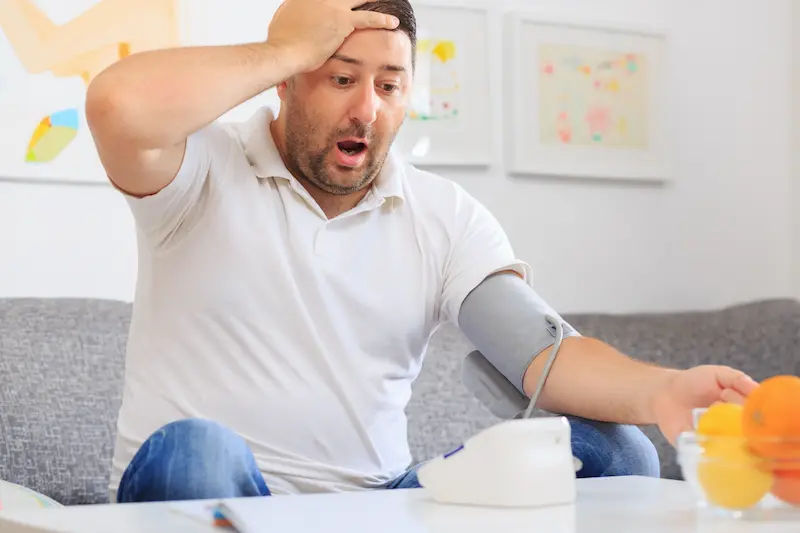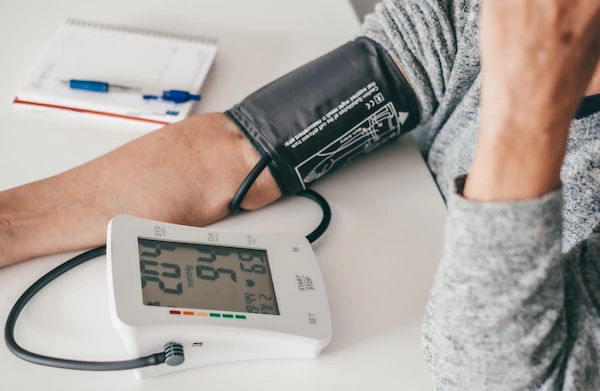Understanding the Stages of Hypertension
Understand the stages of hypertension, from elevated blood pressure to severe hypertension. Learn how each stage affects your health and the importance of early detection and management.

Written by Dr. M L Ezhilarasan
Reviewed by Dr. Shaik Abdul Kalam MD (Physician)
Last updated on 13th Jan, 2026
.webp?tr=q-80,f-webp,w-350,dpr-2,c-at_max 700w)
Hypertension, commonly known as high blood pressure, is a condition that affects millions of people worldwide. Often called the "silent killer," it usually has no noticeable symptoms but can lead to serious health complications if left untreated. Understanding the different stages of hypertension can help you take the right steps to manage it effectively.
What Is Hypertension?
Blood pressure is the force exerted by blood against the walls of your arteries as your heart pumps it through your body. Hypertension occurs when this pressure is consistently too high, putting extra strain on your heart and blood vessels.
Blood pressure is measured using two numbers:
- Systolic pressure (top number): The pressure when your heart beats.
- Diastolic pressure (bottom number): The pressure when your heart rests between beats.
A normal blood pressure reading is around 120/80 mmHg. Higher readings indicate different stages of hypertension.
Consult top Specialist
The Stages of Hypertension
The American Heart Association (AHA) classifies blood pressure into four main categories:
1. Normal Blood Pressure
- Reading: Less than 120/80 mmHg
- What it means: Your blood pressure is in a healthy range. Continue maintaining a balanced diet, regular
- exercise, and routine check-ups.
2. Elevated Blood Pressure (Prehypertension)
- Reading: Systolic 120-129 and Diastolic less than 80
- What it means: You don’t have hypertension yet, but you’re at risk. Lifestyle changes can help prevent progression.
3. Stage 1 Hypertension
- Reading: Systolic 130-139 or Diastolic 80-89
- What it means: You have early-stage hypertension. Your doctor may recommend lifestyle changes and possibly medication.
4. Stage 2 Hypertension
- Reading: Systolic 140 or higher or Diastolic 90 or higher
- What it means: This is a more serious stage, requiring medical treatment along with lifestyle modifications.
5. Hypertensive Crisis (Emergency Situation)
- Reading: Systolic over 180 and/or Diastolic over 120
- What it means: This is a medical emergency. Seek immediate help if you experience severe headaches,
- chest pain, shortness of breath, or confusion.
What Causes Hypertension?
Several factors contribute to high blood pressure, including:
- Unhealthy diet (high salt, processed foods, low potassium)
- Lack of physical activity
- Obesity
- Smoking and excessive alcohol
- Chronic stress
- Family history of hypertension
- Age (risk increases as you get older)
- Underlying conditions (kidney disease, diabetes, sleep apnea)
How Does Hypertension Affect Your Health?
If left uncontrolled, high blood pressure can damage vital organs, leading to:
- Heart disease (heart attack, heart failure)
- Stroke
- Kidney damage
- Vision loss
- Memory problems (dementia)
How to Manage Hypertension
Managing hypertension is essential to reduce the risk of heart disease, stroke, kidney failure, and other complications. Here's a step-by-step approach:
1. Lifestyle Changes
- Eat a heart-healthy diet (DASH diet, rich in fruits, vegetables, whole grains, and low-fat dairy).
- Reduce salt intake (less than 1,500 mg/day if possible).
- Exercise regularly (at least 150 minutes of moderate activity per week).
- Maintain a healthy weight.
- Limit alcohol and quit smoking.
- Manage stress (meditation, deep breathing, yoga).
2. Medication (If Prescribed by a Doctor)
- Diuretics (water pills)
- ACE inhibitors
- Beta-blockers
- Calcium channel blockers
3. Regular Monitoring
- Check your blood pressure at home.
- Visit your doctor for routine check-ups.
When to Seek Medical Help?
If your blood pressure readings are consistently high, or if you experience symptoms like:
- Severe headaches
- Chest pain
- Shortness of breath
- Blurred vision
- Dizziness
Consult a doctor immediately. Early detection and treatment can prevent complications.
Take Control of Your Blood Pressure Today!
Hypertension is manageable with the right approach. Small lifestyle changes can make a big difference in keeping your blood pressure under control.
If you need expert advice, consider booking a consultation with a specialist through Apollo 24|7. Early intervention can help you lead a healthier, longer life.
Conclusion
Understanding the stages of hypertension is key to preventing serious health complications. From elevated blood pressure to stage 2 hypertension and hypertensive crisis, each stage signals an increasing level of risk. Early detection, regular monitoring, and timely lifestyle changes or medical treatment can help manage blood pressure effectively.
Consult top Specialist
Consult top Specialist

Dr. Abhishek Gowda
General Physician/ Internal Medicine Specialist
3 Years • MBBS MD General Medicine
Bengaluru
PRESTIGE SHANTHINIKETAN - SOCIETY CLINIC, Bengaluru

Dr. Utsa Basu
Diabetologist
14 Years • MBBS, MD
Kolkata
Dr Utsa Basu Clinic, Kolkata
(400+ Patients)

Dr. Pinaki Mukhopadhyay
General Physician/ Internal Medicine Specialist
33 Years • MBBS
Kolkata
MCR SUPER SPECIALITY POLY CLINIC & PATHOLOGY, Kolkata
(25+ Patients)

Dr. Shiv Krishna Mitra
General Physician/ Internal Medicine Specialist
15 Years • MBBS GEN. MED. PGDRM, MCH
Kolkata
Samaritan Clinic, Kolkata

Dr. Khuda Baksh Nagur
General Physician/ Internal Medicine Specialist
11 Years • MBBS, MD (GENERAL MEDICINE), Certificate Programme clinicians in Diabetes Management
Bengaluru
Medwin multispeciality clinic, Bengaluru
(25+ Patients)
Consult top Specialist

Dr. Abhishek Gowda
General Physician/ Internal Medicine Specialist
3 Years • MBBS MD General Medicine
Bengaluru
PRESTIGE SHANTHINIKETAN - SOCIETY CLINIC, Bengaluru

Dr. Utsa Basu
Diabetologist
14 Years • MBBS, MD
Kolkata
Dr Utsa Basu Clinic, Kolkata
(400+ Patients)

Dr. Pinaki Mukhopadhyay
General Physician/ Internal Medicine Specialist
33 Years • MBBS
Kolkata
MCR SUPER SPECIALITY POLY CLINIC & PATHOLOGY, Kolkata
(25+ Patients)

Dr. Shiv Krishna Mitra
General Physician/ Internal Medicine Specialist
15 Years • MBBS GEN. MED. PGDRM, MCH
Kolkata
Samaritan Clinic, Kolkata

Dr. Khuda Baksh Nagur
General Physician/ Internal Medicine Specialist
11 Years • MBBS, MD (GENERAL MEDICINE), Certificate Programme clinicians in Diabetes Management
Bengaluru
Medwin multispeciality clinic, Bengaluru
(25+ Patients)




